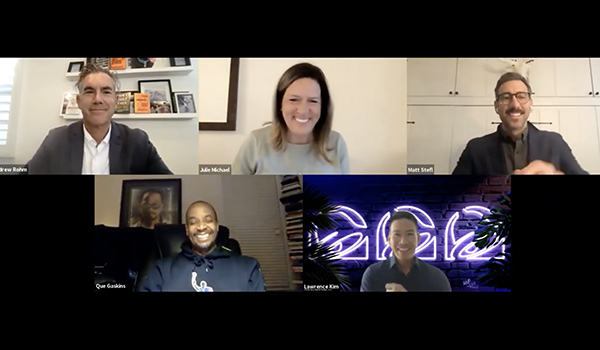
On March 10, the Center for International Business Education partnered with LMU’s M-School on an interactive webinar titled “Perspectives on Innovative Global Marketing.” This event attracted a large crowd of students, faculty and staff to hear from three top experts in global marketing.
Moderated by LMU Marketing Professors Andy Rohm and Matt Stefl, the webinar featured Julie Michael, CEO, Team One; Lawrence Kim, Vice President, Global Brand Strategy and Planning, Taco Bell; and Henry “Que” Gaskins, Chief Brand and Innovation Officer, National Basketball Players Association.
Stefl kicked off the webinar by asking the panelists how their brands have connected with people in organizations across other countries, especially during the pandemic. The panelists touched on the importance of adjusting to the different interests and needs in each country and within their particular industries.
The conversation shifted to the challenges that each panelist has faced while working internationally. Gaskins, who promotes professional basketball players internationally, noted some of the challenges of working with China, such as the difficulty in finding licenses and having to adjust to different media platforms.
Kim spoke of similar challenges. He said that from a marketing standpoint, he focuses on the needs of the consumer, as well as those of the business. Since each country differs from the other, it is crucial to understand how to navigate different marketplaces.
Michaels shared a similar experience, and explained how she can go to Shanghai and market a product, but will have to completely change the marketing strategy in another city, like Paris. She concluded, “It doesn’t matter how global you are, it’s really about being relevant in each market.” Gaskins agreed and added, “My main goal is to think global, act local, and build community.”
Stefl then asked the panelists what they believe to be the “sacred” elements of a local branding strategy. “How do you know which elements those are, and how do you decipher what are the things that you can ultimately change?”
Michaels responded by saying, “The things that are true to a company’s DNA do not change, it is the expression of that [DNA] that can change market to market.” She believes that a company’s DNA should be fixed but when talking about consumers, strategies should differ to tend to different wants and needs. Lastly, she added that marketing strategies are no longer focused on a product itself, rather they are focused on the experience the consumer encounters with the good or service.
Gaskins agreed. “A brand is a promise of quality that is wrapped in experience,” he said. Using Nike as an example he noted, “At Nike, the product is the marketing, the consumer is the brand. Through the experience of the consumers, the brand is formed.” Kim added, “It used to be the brand telling their story, now it is the consumers telling their story in relationship to the brand.”
In closing, Yongsun Paik, director of the Center for International Business Education, asked the panelists to share what they believe are the most important skills for students to develop for a career with global companies. The panelists agreed that creative writing, problem-solving, adaptability, relationship building, and critical thinking skills are keys to success in the global marketplace.
“This webinar provided a great opportunity for the LMU community to learn from accomplished business practitioners,” said Paik.
View this webinar here.



